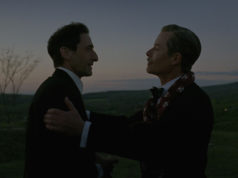
The literary world is in a predictable tizzy about this week’s release of Anonymous, a movie that purports to argue the point of view known as the Oxfordian theory: That the 17th earl of Oxford was the real author of Shakespeare’s plays, sonnets, and epic poems. Counter-arguments are popping up all over the web. Not only is the Oxfordian theory itself cracked, but the movie gets so many historical facts wrong that it fails to make any effective argument in favor of the theory. The most creative response I’ve seen so far is the road-sign graffiti by the Shakespeare Birthplace Trust.
I agree with all the counter-arguments, but I find myself unable to work up much outrage. I tend to pity the Oxfordians in the same way that I feel sorry for the anti-Obama “birthers,” the UFO conspiracy theorists, and anyone who believes in astrology. Yet there is an element of class snobbery in Oxfordianism that makes it particularly unattractive.
The idea that the earl of Oxford was the plays’ author was first advanced by English schoolteacher J. Thomas Looney in a 1920 book called Shakespeare Identified. More worrying than the man’s unfortunate surname is the fact that Looney had gone through not one but two major religious crises in his life before taking up the Oxford cause. (Having lost faith while training to be a Methodist minister, he took up Auguste Comte’s “Religion of Humanity” before his attempts at establishing a church of that religion failed.) This brought Looney into line with the profile of people who take up crackpot causes.
Looney’s elitist ideas were enthusiastically taken up by certain segments of Anglo-American society: Shakespeare couldn’t possibly have been intellectually equipped to write the plays attributed to him, which show familiarity with (among other things) statecraft and diplomacy, military strategy, nautical terms, business practices, Greek and Roman history, music, dance, fencing. How could a glovemaker’s son with a grammar-school education obtained in provincial Warwickshire know about all these subjects? The opening monologue of Anonymous (delivered on a present-day New York stage by Sir Derek Jacobi, a great Shakespearean actor who is a real-life Oxfordian) says as much. The plays must have been written by a university man, the doubters say.
This is not only insulting but also flat-out wrong. Great artists routinely come from humble backgrounds, and they were common during the golden age of English theater. Christopher Marlowe was a shoemaker’s son, while younger playwright John Webster was the son of a man who made coaches for horses. Ben Jonson himself grew up as the stepson of a bricklayer. Marlowe was unusual in that he was in fact a university man, but the plays of their contemporaries weren’t lacking in educated references. Jonson wore his learning rather heavily, actually: his plays are dotted with classical quotations, often in the original Latin or Greek. Moreover, Shakespeare himself likely received a pretty good education; Stratford wasn’t a backwater, but rather a thriving port town that brought in people from distant corners of Europe. It’s telling, too, that the syllabus of the school where Shakespeare went has a number of books whose stories would form the basis of Shakespeare’s plays.
The Oxfordians tend to overlook how theater people actually do what they do. It’s in the professional interests of actors and playwrights to associate with people of many different stripes, in order to get a feel for the language they use, the mannerisms that tend to accrue to them, and the mindsets that they cultivate. That’s how a glovemaker’s son who never traveled outside of England would come to have knowledge of so many things beyond his sphere.
And the Oxfordians never account for the curious errors in Shakespeare’s plays. Julius Caesar has a reference to the hour being struck even though it takes place several centuries before the invention of striking clocks. Twelfth Night takes place in what is now Albania, yet its characters sport a mixture of Italian and English names for some reason. A Winter’s Tale is set on the seacoast of Bohemia, which is hundreds of miles from any open water. Artistic liberties? Perhaps, but the Julius Caesar flub in particular strikes me as the sort of thing a more educated writer would have excised.
Well, at least Anonymous has people talking about the period, and allowed me to go all wonkish on you. I highly recommend you read up on Elizabethan and Jacobean theater. It’s deliciously entertaining, with all manner of political intrigue, sexual perversity, and methods of murder creative enough to put even Suzanne Collins to shame. Occasionally it veers into self-parodying excess; there’s one play in which the antihero accidentally kills himself with an axe and then gives a whole speech with the axe sticking out of his head. (I thought the play in question was by George Chapman, but I may have been wrong about that. Readers?) Still, it’s often a lot of fun. Marlowe and Jonson are pretty well-known, but their less famous colleagues wrote some good stuff, too. You should try Middletown and Rowley’s The Changeling, Cyril Tourneur’s The Revenger’s Tragedy (which ends with seven major characters murdered), and John Ford’s ‘Tis Pity She’s a Whore (incest!). Best of all are John Webster’s The White Devil and The Duchess of Malfi. Webster popped up as a character in the film Shakespeare in Love as a blood-and-gore-obsessed little boy, which isn’t really a fair characterization. Lurid though his plays are, they also have phantasmagoric imagery, memorable characters (especially The Duchess of Malfi), and a sure sense of stagecraft. They should be staged more often. Perhaps one of our local troupes will oblige?
One other thing: I wish the makers of Anonymous had included a cameo appearance by Shakespeare’s wife and cast Anne Hathaway in the role. That would have been cute.












Wonderful piece, Kristian. Great.
I suggest people read both the Oxfordian and the Stratfordian arguments. Both are compelling. Though I am not convinced either way, I have always leaned toward de Vere as the author. It’s not, as Lin sneeringly implies, merely a matter of class prejudice.
By “Middletown” are you perhaps referring to
Thomas Middleton, c1580-1627?
As to who wrote Shakespeare,I once learned of a theory that it was Christopher Marlowe. It was quite convincing.